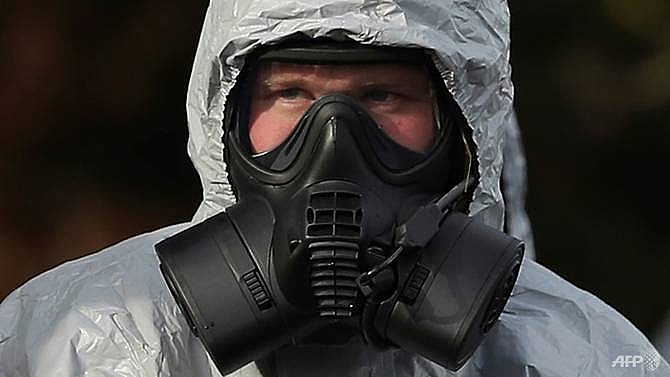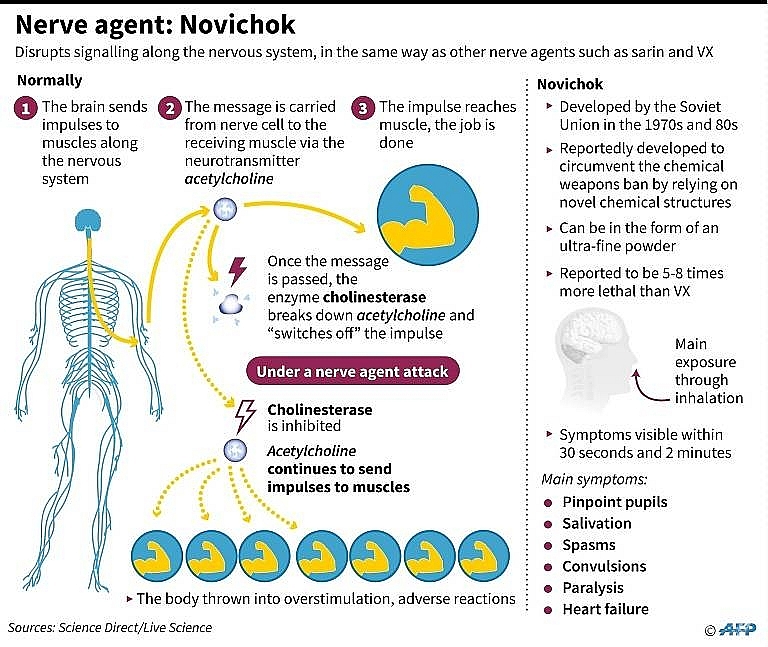Russia hits back in spy poisoning row as experts called in
 |
| Since the poisoning, the English city of Salisbury has been filled with investigators garbed in protective equipment. (Photo: AFP/Daniel Leal-Olivas) |
The poisoning of former double agent Sergei Skripal plunged relations between London and Moscow into crisis, shortly before the re-election of Russian President Vladimir Putin.
But as the European Union offered "unqualified solidarity" with Britain, the Kremlin insisted that Britain prove Russia was involved in the Mar 4 attack or apologise.
"Sooner or later these unsubstantiated allegations will have to be answered for: either backed up with the appropriate evidence or apologised for," said Putin's spokesman Dmitry Peskov.
Putin on Sunday rejected as "complete drivel, rubbish, nonsense" the allegations by London and its allies that Russia was behind the attack on Sergei Skripal and his daughter Yulia in the English city of Salisbury.
'PATTERN OF BEHAVIOUR'
But on Monday, British Prime Minister Theresa May reiterated her belief that Russia was responsible.
"They have the capability. This nerve agent was one from a group of Novichoks that were developed by the Soviets," she said during a visit to Birmingham.
"Russia has the capability and I believe the motive and intent and this is part of a pattern of behaviour we see from Russia across Europe."
The EU said it fully backed Britain.
"The European Union expresses its unqualified solidarity with the UK and its support, including for the UK's efforts to bring those responsible for this crime to justice," EU foreign ministers said in a joint statement.
Skripal, a former Russian officer who sold secrets to Britain and moved there in a 2010 spy swap, remains in critical condition along with his daughter after they were found unconscious on a park bench.
Investigators from the international Organisation for the Prohibition of Chemical Weapons (OPCW) were to visit Britain on Monday to collect samples of the nerve agent used.
They will meet officials from the Defence Science and Technology Laboratory at Porton Down, coincidentally located near Salisbury, where the chemical was identified as the Soviet-designed Novichok.
 |
| Factfile on the Soviet-era nerve agent Novichok. (Graphic: AFP/John Saeki) |
They will also meet police before sending samples to international laboratories for testing, with results expected to take at least two weeks, according to British officials.
PUTIN DEFIANT
Britain last week announced the expulsion of 23 Russian diplomats, prompting a tit-for-tat response from Moscow. Britain also announced a boycott by members of the royal family and ministers of this summer's World Cup football tournament in Russia.
In a joint statement last week, the leaders of the United States, Germany and France backed Britain's analysis of what is considered to be the first offensive use of a nerve agent on European soil since World War II.
The three countries called for Russia to fully disclose details of its Novichok programme to the OPCW, a demand also backed by the EU foreign ministers on Monday.
In his first direct comments on the incident, after winning a fourth term in Russia's election on Sunday, Putin was defiant.
"We have destroyed all chemical weapons," he said, pledging that Russia was ready to cooperate in the investigation.
'MALIGN BEHAVIOUR
Arriving in Brussels for the EU talks, British Foreign Secretary Boris Johnson said: "They're not fooling anybody any more.
"The Russian denials grow increasingly absurd. This is a classic Russian strategy of trying to conceal the needle of truth in a haystack of lies and obfuscation."
On Sunday, Johnson also accused Moscow of stockpiling the nerve agent in violation of the international Chemical Weapons Convention.
"We actually have evidence within the last 10 years that Russia has not only been investigating the delivery of nerve agents for the purposes of assassination, but has also been creating and stockpiling Novichok," he told BBC television.
But Moscow has accused London of casting the blame too hastily, and its ambassador to the EU suggested at the weekend that Britain itself may have been the source of the chemical.
Britain has pointed to a similar case from the recent past: the 2006 radiation poisoning of former spy and Kremlin critic Alexander Litvinenko in London.
London has also emphasised what it says is a pattern of Russian aggression, including its annexation of Crimea and alleged meddling in Ukraine, which has already prompted heavy EU sanctions.
"There is scarcely a country round the table here in Brussels that has not been affected in recent years by some kind of malign or disruptive Russian behaviour," Johnson said Monday.
What the stars mean:
★ Poor ★ ★ Promising ★★★ Good ★★★★ Very good ★★★★★ Exceptional
Related Contents
Latest News
More News
- Russian President congratulates Vietnamese Party leader during phone talks (January 25, 2026 | 09:58)
- Worldwide congratulations underscore confidence in Vietnam’s 14th Party Congress (January 23, 2026 | 09:02)
- Political parties, organisations, int’l friends send congratulations to 14th National Party Congress (January 22, 2026 | 09:33)
- 14th National Party Congress: Japanese media highlight Vietnam’s growth targets (January 21, 2026 | 09:46)
- 14th National Party Congress: Driving force for Vietnam to continue renewal, innovation, breakthroughs (January 21, 2026 | 09:42)
- Vietnam remains spiritual support for progressive forces: Colombian party leader (January 21, 2026 | 08:00)
- Int'l media provides large coverage of 14th National Party Congress's first working day (January 20, 2026 | 09:09)
- Vietnamese firms win top honours at ASEAN Digital Awards (January 16, 2026 | 16:45)
- ASEAN Digital Ministers' Meeting opens in Hanoi (January 15, 2026 | 15:33)
- ASEAN economies move up the global chip value chain (December 09, 2025 | 13:32)

 Tag:
Tag:




















 Mobile Version
Mobile Version